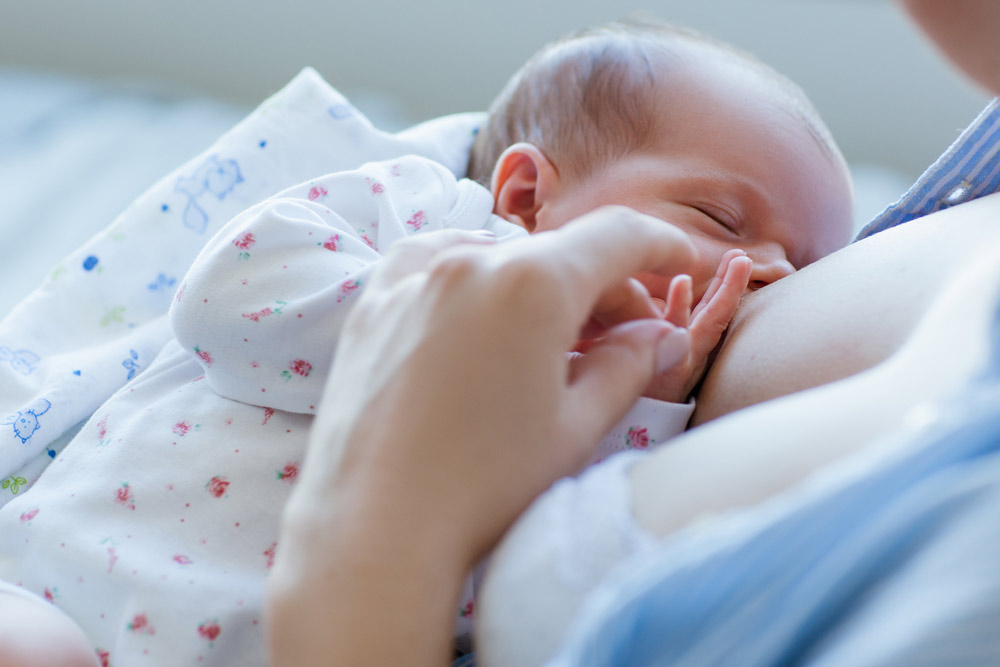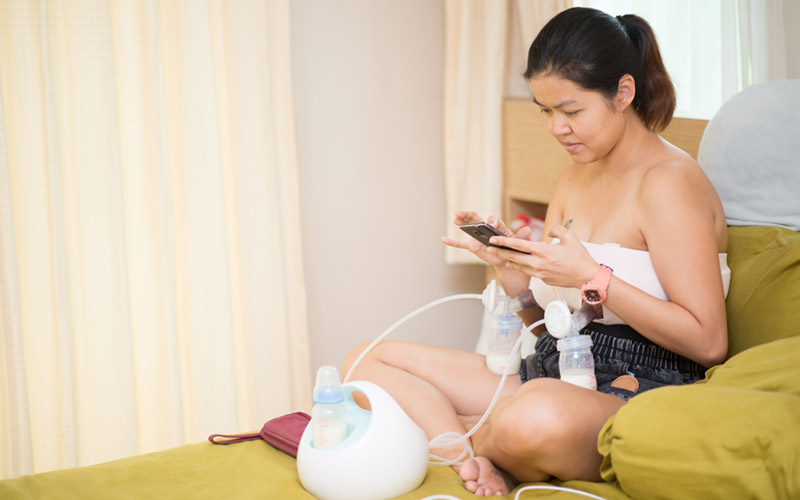Nursing School: Expert Advice on Alcohol and Breastfeeding

Like so many parts of parenthood, whether or not a nursing mom can or should drink is seemingly always up for discussion and attracts a bevy of opinions. Depending on who you ask, moms should either practice pumping and dumping to air on the side of caution, or they shouldn’t be too worried and feel free to continue with regular feedings. But what does science say? And is there always a concrete answer? We asked Jennifer Ritchie, IBCLC, author of The Smart Parents Guide to Breastfeeding, to help make sense of all the heated hearsay.
Is there a safe amount of alcohol for breastfeeding?
Moms entertaining the idea of happy hour may wonder how much is too much, and whether there’s a foolproof formula to follow. Ritchie says that breastfeeding mothers and alcohol consumption is a not only a very common topic, but that many parents lack details on the science behind how much alcohol actually goes into breast milk.
She goes on to illustrate, “In his book on lactation, Dr. Jack Newman explains, ‘Depending on the jurisdiction, you are considered too drunk to drive with more than 0.05 percent to 0.1 percent alcohol in your blood. Alcohol behaves differently from other drugs. The concentration of alcohol in blood and breastmilk is about the same. So, if the mother has 0.06 percent alcohol in her blood, she will have 0.06 percent alcohol in her milk. This is not a concentration of alcohol that is going to make the baby sick or cause brain damage (as some have suggested).'”
According to Ritchie, the simple explanation is to review the DMV guidelines for your state and see how many drinks it takes to be legally too drunk to drive. “If you are below that level of alcohol, it is safe for a nursing baby. For example, a 140 pound woman could consume one drink every hour and the blood alcohol content would be .05 percent. So, if you are sober enough to drive, you are sober enough to breastfeed.”
Is there a scenario where a mom should “pump and dump”?
While tossing breast milk is usually used as a safety measure after a few too many libations, there are other scenarios where refraining from feeding your expressed milk should be considered.
1| Your milk wasn’t properly stored.
The Centers for Disease Control and Prevention (CDC) gives detailed guidelines on how to safely store and prepare fresh and frozen mother’s milk. If you forget about that thawing bottle on the counter that has since gone lukewarm (about 1-2 hours max), it’s probably questionable and is best discarded.
2| You pumped in an unsanitary environment.
It isn’t right, but sometimes you’re forced to pump in areas simply unfit for baby’s next meal. Whether you’re trapped in an airport bathroom or need to ease engorgement and haven’t had a chance to sanitize pump parts, you won’t want to risk giving you little one potentially contaminated milk.
3| You’re using certain medications.
If prescribed a short- or long-term prescription, check with your health care provider on whether or not it’s safe to use while breastfeeding. She may suggest a temporary or full wean depending on your certain situation and desired outcomes.
4| Your dinner choices were debatable.
If baby has sensitivities you typically adhere to, but you diverted from your dairy free diet when someone mentioned queso (we get it), avoid a possible reaction and dump it out. This can also apply if you have had an excess of caffeine.
5| You used illicit drugs.
No amount of recreational drug use is considered safe for breastfeeding moms. Chemicals travel through breast milk to infants and can be detrimental to your child. Seek assistance if you are using drugs and do not feed your baby your breast milk for the time being.
When it comes to alcohol intake, Ritchie isn’t on the fence about taking or leaving breast milk after a sole glass of wine. “There is no need to pump and throw away your breast milk after having an alcoholic drink, unless you are engorged and need to express to maintain your milk supply. The alcohol will naturally leave the milk in your breasts as it leaves the bloodstream and pumping won’t hurry the process.”

What are the short- and long-term effects of drinking while nursing for a newborn?
According to Ritchie, the primary short-term effect is quality of care for the infant from its mother, as alcohol impairs decision making and slows reaction time. “The biggest concern is drinking alcohol and the effect it can have on a mother’s capacity to look after her baby, particularly enough alcohol to make her feel disorientated or sick.”
Even if you’re well enough to breastfeed, your baby may have reservations about what’s on tap, making her feeding less effective. “The Womanly Art of Breastfeeding explains that babies seem to take less milk when there is alcohol in it which could affect a baby’s growth and ability to thrive,” she says. “Alcohol in large quantities can also affect oxytocin (a hormone that acts on organs in the body—including the breast and uterus—and as a chemical messenger in the brain) and the milk ejection reflex. Thomas Hale research shows that to affect lactating women’s let-down process, a blood alcohol level (BAC) of 1.5 to 1.9 grams per kilogram of alcohol will need to be consumed.”
What timeline should a breastfeeding mom follow to avoid transferring alcohol to her baby?
If you’re hoping to celebrate a special occasion with a glass of bubbly, you should plan to nurse your little one as close as possible to the time you take your first sip. That way, you can coordinate baby’s next session with a reasonable amount of time to allow the alcohol to metabolize and exit your system.
“Small amounts of alcohol do go into breast milk when consuming an alcoholic beverage,” says Ritchie. “The concentration of alcohol peaks in breast milk about 30-60 minutes after the drink is consumed, and then the levels gradually fall if the mother doesn’t have another drink. A couple of hours after having an alcoholic beverage, the alcohol will have mostly left your breast milk. If a mother is concerned, she could simply avoid breastfeeding for two or three hours after she has had a drink.”
Bottom line: The easiest way for nursing mothers to eliminate worry is by limiting large amounts of consumption and allowing time to do its thing.
If mom is still apprehensive, is there anything else she can do with her pumped milk?
There are many additional uses for tainted milk or milk that has been left out too long. (Your liquid gold is anything but a one-trick pony!) Try one of these nifty alternatives to tossing:
1| Start treating pinkeye.
Breast milk contains immunological agents and antibacterial compounds that can help sterilize the eye of bacteria. (You’ll still want to call your pediatrician, as most cases require an antibiotic to fully clear up.)
2| Relieve eczema.
Just like you can rub your milk on chapped or irritated nipples to help heal and moisturize, the same applies to baby’s skin issues, including acne, cradle cap and diaper rash. You can add milk to bathwater as well to use for a soothing soak.
3| Add it to your first-aid kit.
Breast milk can act as your primer for cleaning and disinfecting cuts or be applied to sunburn.
When it comes to use of human milk that contains alcohol, it’s worth noting that freezing it for later may still be an option, as your baby’s age could play a factor in whether or not it can be consumed safely. “A newborn has a very immature liver, so minute amounts of alcohol would be more of a concern,” explains Ritchie. “Up until around 3 months of age, infants detoxify alcohol at around half the rate of an adult. An older baby or toddler can metabolize the alcohol more quickly, so the tainted milk could be fed to an older baby if desired.”







